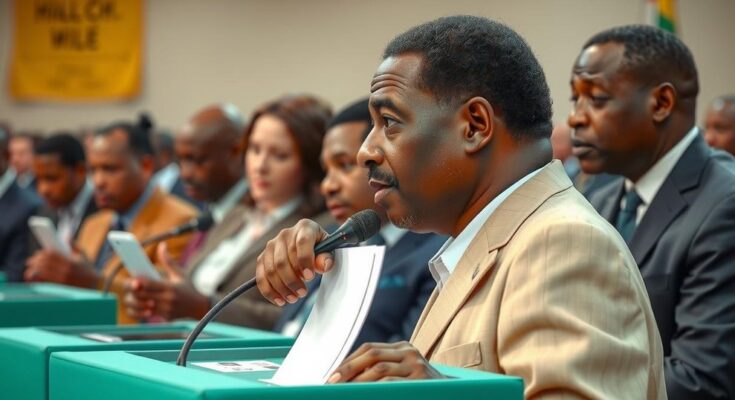Chad’s parliamentary elections are underway for the first time in 13 years, framed as a step towards democratic transition following military rule. Voter turnout is low, with significant opposition boycott claims of predetermined results, casting doubt on election legitimacy. Security threats and socioeconomic challenges continue to loom as the nation navigates this crucial political moment.
Voting is currently taking place in Chad for the nation’s first parliamentary election in 13 years, an event the government has framed as a critical move towards transitioning from military rule. Citizens will cast their votes for a new parliament, as well as for provincial assemblies and local councils in a nation facing significant socioeconomic challenges. Despite these developments, opposition groups have declared a boycott, asserting that the election results have been predetermined.
In the capital, N’Djamena, voter turnout has been notably low since the polling stations commenced operations. Election officials suggested that inclement weather may have contributed to this lack of participation; however, opposition leaders claimed that many citizens chose to abstain due to a lack of confidence in the electoral process. They argued that the election is being manipulated to ensure success for candidates loyal to President Mahamat Idriss Deby Itno, who has been in power since a military coup in 2021.
President Deby expressed his hopes for a substantial voter turnout on social media, branding the election a “historic day.” Conversely, opposition figure Succes Masra criticized the legitimacy of the process, contending that “the fabricated results are already in the computers.” Local voters have voiced their desire for change, expressing concerns over employment opportunities, rising costs of living, and calls for greater social equity.
The voting process has also seen soldiers, police officers, and nomadic populations participating ahead of the general election day for logistical purposes. Reports from Chad’s electoral agency indicate significant mobilization among these groups, stating a recorded turnout of over 72 percent in the military sector. Meanwhile, concerns have been raised regarding the integrity of the electoral process, with the opposition alleging instances of ballot manipulation across different precincts.
These elections are being conducted amid serious security threats from Boko Haram and critical geopolitical developments involving Chad’s relations with France and Sudan. The government positions this electoral event as essential for the nation’s final stages of transitioning to democracy, following a long-standing period of autocracy under former President Idriss Deby.
As Chadians engage in this significant electoral exercise, the outcome remains uncertain amid widespread skepticism and calls for vigilance to ensure a fair democratic process.
Chad, one of the poorest countries in the world, is currently in the process of rebuilding its political system following years of military governance. The recent call for elections is part of a broader governmental strategy aimed at fostering democratic principles after the military takeover that followed the death of long-term leader Idriss Deby. The political climate is fraught with tension, partially due to opposition parties questioning the government’s credibility and the electoral framework established under President Mahamat Idriss Deby Itno. With allegations of electoral fraud and a low voter turnout, the country remains polarized as citizens express a range of hopes and frustrations regarding the new parliamentary elections.
In summary, Chad’s parliamentary elections represent a pivotal moment in the nation’s transition towards democratic governance, yet they are overshadowed by allegations of fraud and a significant opposition boycott. While the government promotes the elections as a step forward, widespread skepticism among citizens, particularly opposition leaders, raises questions about the legitimacy of the electoral process and the future of democracy in Chad. The outcomes of these elections will likely have lasting implications for the political landscape, societal conditions, and international relations within the region.
Original Source: www.aljazeera.com




